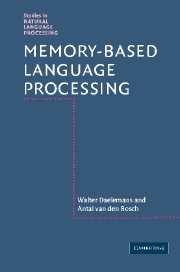Book contents
1 - Memory-Based Learning in Natural Language Processing
Published online by Cambridge University Press: 22 September 2009
Summary
This book presents a simple and efficient approach to solving natural language processing problems. The approach is based on the combination of two powerful techniques: the efficient storage of solved examples of the problem, and similarity-based reasoning on the basis of these stored examples to solve new ones.
Natural language processing (NLP) is concerned with the knowledge representation and problem solving algorithms involved in learning, producing, and understanding language. Language technology, or language engineering, uses the formalisms and theories developed within NLP in applications ranging from spelling error correction to machine translation and automatic extraction of knowledge from text.
Although the origins of NLP are both logical and statistical, as in other disciplines of artificial intelligence, historically the knowledge-based approach has dominated the field. This has resulted in an emphasis on logical semantics for meaning representation, on the development of grammar formalisms (especially lexicalist unification grammars), and on the design of associated parsing methods and lexical representation and organization methods. Well-known textbooks such as Gazdar and Mellish (1989) and Allen (1995) provide an overview of this ‘rationalist’ or ‘deductive’ approach.
The approach in this book is firmly rooted in the alternative empirical (inductive) approach. From the early 1990s onwards, empirical methods based on statistics derived from corpora have been adopted widely in the field. There were several reasons for this.
- Type
- Chapter
- Information
- Memory-Based Language Processing , pp. 3 - 14Publisher: Cambridge University PressPrint publication year: 2005



